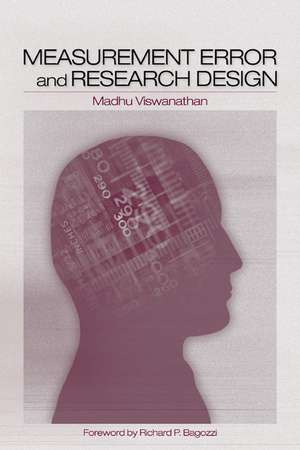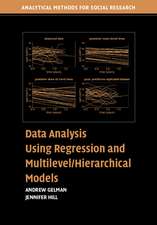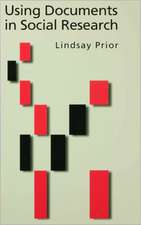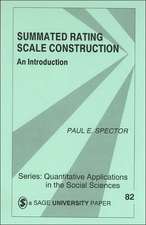Measurement Error and Research Design
Autor Madhu Viswanathanen Limba Engleză Paperback – 11 mai 2005
Preț: 847.74 lei
Preț vechi: 1033.83 lei
-18% Nou
162.27€ • 176.32$ • 136.39£
Carte tipărită la comandă
Livrare economică 21 aprilie-05 mai
Specificații
ISBN-10: 1412906423
Pagini: 456
Ilustrații: Illustrations
Dimensiuni: 152 x 229 x 24 mm
Greutate: 0.61 kg
Ediția:New.
Editura: SAGE Publications
Colecția Sage Publications, Inc
Locul publicării:Thousand Oaks, United States
Recenzii
"This book provides a useful systematic introduction to an important and neglected area, that of measurement error in the social sciences. It will prove valuable both to students studying this topic in courses, and to Ph.D. students and researchers starting to carry out social research under their own steam."
"A particular virtue of the book is the author's balanced perspective. He acknowledges the reductionism that too often accompanies our increasingly sophisticated research methods—the risk that as we learn more and more about narrower issues we will lose sight of the larger contexts in which they are embedded. Essential, too, in the author's view, is a receptive stance on the part of the researcher, who should maintain an openness to alternative theories, to different measures and methods, and to different interpretations of data."
"The principles and methods outlined in this text are likely to be useful and necessary to researchers who are developing new studies."
Cuprins
Preface
Acknowledgments
1. WHAT IS MEASUREMENT?
Overview
What Is Measurement Error?
Overview of Traditional Measure Development Procedures
Conceptual and Operational Definitions
Domain Delineation
Measure Design and Item Generation
Internal Consistency Reliability
Test-Retest Reliability
Dimensionality - Exploratory Factor Analysis
Dimensionality - Confirmatory Factor Analysis and Structural Equation Modeling
Validity
General Issues in Measurement
Summary
Appendices
2. WHAT IS MEASUREMENT ERROR?
Overview
Random Error
Systematic Error
Types of Random and Systematic Error
Illustrations of Measurement Error Through Error Patterns
Patterns of Responses in Measurement Error
Summary
Appendix
3. WHAT CAUSES MEASUREMENT ERROR?
Overview
Sources of Measurement Error
Taxonomy of Error Sources
Summary
4. CAN EMPIRICAL PROCEDURES PINPOINT TYPES OF MEASUREMENT ERROR?
Overview
Internal Consistency Reliability Procedures
Test-Retest Reliability Procedures
Factor Analysis Procedures
Validity Tests
Summary
5. HOW CAN MEASUREMENT ERROR BE IDENTIFIED AND CORRECTED FOR IN MEASURE DEVELOPMENT?
Overview
Guidelines for Identifying and Correcting For Error in Measure Development
Generic Issues in Designing Psychometric Tests
Item-to-Total Correlations (Internal Consistency Procedures)
Item Means
Test-Retest Correlations (Test-Retest Reliability)
Factor Loadings (Exploratory Factor Analysis)
Residuals (Confirmatory Factor Analysis)
Cross-Construct Correlations (Validity Tests)
Conditions of Future Use of Measures
Discussion
Summary
6. HOW CAN ERROR BE IDENTIFIED THROUGH INNOVATIVE DESIGN AND ANALYSES?
Overview
Using Internal Consistency and Test-Retest Reliability in Conjunction
Using Correlations Across Item-Level Correlations
Empirical Assessment of Item-Sequencing Effects
Summary
7. HOW DO MEASURES DIFFER?
Overview
Stimulus-Centered Versus Respondent-Centered Scales
Formative and Reflective Indicators of Constructs
Summary
8. WHAT ARE EXAMPLES OF MEASURES AND MEASUREMENT ACROSS VARIOUS DISCIPLINES?
Overview
Types of Measures
Types of Response Formats
Specific Examples of Scales From Different Disciplines
Cross-Cultural Measurement
Summary
9. WHAT ARE THE IMPLICATIONS OF UNDERSTANDING MEASUREMENT ERROR FOR RESEARCH DESIGN AND ANALYSIS?
Overview
Implications for Using Measures in Research Design
Implications for Using Structural Equation Modeling
Implications for Applied Research
Summary
10. HOW DOES MEASUREMENT ERROR AFFECT RESEARCH DESIGN?
Overview
Types of Research Designs
Measurement Error in Survey Designs
Measurement Error in Experimental Designs
Research Design and Measurement Error
Summary
Appendices
11. WHAT IS THE ROLE OF MEASUREMENT IN SCIENCE?
Overview
Assumptions of Measurement
Qualitative Versus Quantitative Research
Measuring the "Measurable"
From Physical to Psychological Measurement
Informal Measurement
Ethics in Measurement
Summary
12. WHAT ARE THE KEY PRINCIPLES AND GUIDING ORIENTATIONS OF THIS BOOK?
Overview
Summary of Chapters
Implications for Measurement and Research Design
Summary of Orientations
References
Index
About the Author
Notă biografică
Madhu Viswanathan earned Bachelor¿s (Mechanical Engineering, IIT, Madras, India, 1985), and doctoral (Marketing, University of Minnesota, 1990) degrees. He joined Loyola Marymount University in August, 2019, after being on the faculty at the University of Illinois, Urbana-Champaign, for 29 years. His research programs are on measurement, and subsistence marketplaces, where he has authored several books including Measurement Error and Research Design (Sage, 2005), Enabling Consumer and Entrepreneurial Literacy in Subsistence Marketplaces (Springer, 2008), Subsistence Marketplaces (ebookpartnerships, 2013), and Bottom-Up Enterprise (ebookpartnerships, 2016). He has pioneered the area of subsistence marketplaces, with a bottom-up approach to the intersection of poverty and marketplaces (www.business.illinois.edu/subsistence). He taught courses on research methods, subsistence, and sustainability, educational experiences on the latter, reaching almost a thousand students a year at the University of Illinois, and tens of thousands of students around the world through Coursera. He founded and directs the Marketplace Literacy Project (www.marketplaceliteracy.org), pioneering the design and delivery of marketplace literacy education to subsistence marketplaces. With partners and ongoing programs in India, Tanzania, Uganda, Kenya, Argentina, Honduras, Mexico, and Illinois, approximately 100,000 women have received marketplace literacy education. He has received numerous awards and served on the Livelihoods Advisory Board of UNHCR.










